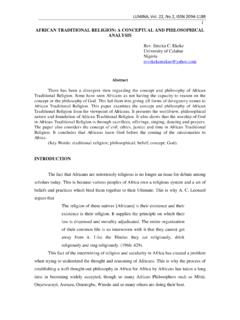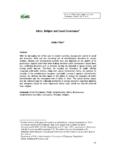Transcription of TEACHER’S GUIDE - NB Publishers
1 teacher S GUIDEG rade 11 English Home Language and English First Additional Language byRose JacksonforWe Shall Not WeepbyJohnny MasilelaKWELA BOOKSC opyright 2006 Rose JacksonPublished by Kwela Booksa division of NB Publishers (Pty) Limited,40 Heerengracht, Cape Town, South Box 6525, Roggebaai, 8012 All rights reserved. No part of this book may be reproduced or transmitted in any form or by any electronic or mechanical means, including photocopying and recording, or by any other information storage or retrieval system, without written permission from the by Rose JacksonEdited by Danya Risti Typography by Nazli JacobsSet in 10 on 14 pt Times RomanPrinted and bound by Paarl Print, Oosterland Street,Paarl, South AfricaFirst edition 2006 ISBN-10: 0-7957-0225-6 ISBN-13.
2 978-0-7957-0225-9 ContentsIntroduction 7 The National Curriculum Statement 7 Principles 7 Learning Outcomes and Assessment Standards 9 Assessment 14 Methods 14 Tools 15 The context of the novel 19 The author 19 Historical and geographical context 19 Political context 21 Religion and beliefs 22 Social organisation and customs 23 Initiation and rites of passage 23 Art and beadwork 24 Marabi music 25 Characters 25 Main characters 25 Minor characters 26 Pre-reading activities 27 Class management 27 Materials 28 Assessment 28 Background research activities 29 Engaging with the book 43 Reading the book 43 Comprehension questions 43 Unfamiliar words 44 Language level 44 Enhancing the atmosphere 44 Enhancing the characters 44 Activity variation 45 Reading activities 46 Answers to the activities 103 Pre-reading activities 103 Reading activities 105 Reviewing the novel 129 Short questions 129 Flow chart 130 Discussion and debate 131 Language and style 132
3 Essay questions 132 Assessment 133 Comprehension questions 135 Glossary 1377 IntroductionThe National Curriculum statementThe National Curriculum Statement (NCS) Grades 10 12 (General) forms the basis of South African teaching and education principles, and is based on the aims of our Constitution. These aims include healing past divisions and establishing a society based on democratic values, social justice and fundamental human rights; improving the quality of life for all citizens so that they can reach their full potential; founding a society in which the rights of all are protected.
4 And building a united country that can take its rightful place as a sovereign state in the family of NCS is based on the following principles: Social transformation: This should ensure that the inequalities of the past are redressed, and that equal educational opportunities are pro-vided for everyone. Outcomes-based education (OBE): This is the foundation of our cur-riculum. It provides four fundamental Learning Outcomes (LOs), which are outcomes that learners need to achieve and by means of which all learners will reach their full potential.
5 Each outcome is accompanied by several specifi c Assessment Standards (ASs) that GUIDE assessment of the learners work. High levels of knowledge and skills: The NCS requires that every learner be empowered to achieve high standards in all subjects. The NCS specifi es the minimum standards of knowledge and skills to be achieved in each grade. Integration and applied competence: OBE aims at the integrated learning of three competencies, namely: practical, theoretical and refl Progression: This is the process through which more advanced and complex knowledge and skills are developed.
6 The LOs and ASs show progression from grade to grade and make clear the expected level of performance and the level of diffi culty. The content and context of each grade also shows progression from the simple to the complex. Articulation and portability: Firstly, this refers to the connection be-tween qualifi cations in the different levels or bands of the National Qualifi cations Framework (NQF), and secondly it indicates the extent to which parts of a qualifi cation can be transferred to another qualifi -cation in a learning pathway of the same band.
7 Human rights, inclusivity, and environmental and social justice: These indicate the inclusive approach followed by the NCS. All learn-ers must have the opportunity to develop to their full intellectual, so-cial, emotional, spiritual and physical potential. This should be achieved through the designing of appropriate Learning Programmes and the use of appropriate assessment instruments. In this Grade 11 GUIDE we pro-vide differentiated questions and tasks according to Home Language (HL), First Additional Language (FAL) and learners with learning barriers.
8 Valuing indigenous knowledge systems (IKSs): These systems are also called multi-intelligences . The NCS acknowledges a body of knowledge that has been embedded in African philosophical thinking and customs for thousands of years. By including indigenous knowl-edge systems, the NCS recognises the rich history and heritage of Af-rica and South Africa and the contribution these knowledges have made to developing and nurturing the values in the Constitution. The novel We shall not Weep is richly detailed in terms of beliefs, customs and unique artwork, thus contributing to the documentation and pres-ervation of a vanishing knowledge of the Ndebele, including their knowledge of traditional healing and culture.
9 Credibility, quality and effi ciency: This refers to quality assurance whose aim is to ensure an education comparable with international standards in terms of quality, breadth and Outcomes and Assessment StandardsAn LO is a statement of the end result that you as a teacher and the learn-ers should achieve in learning and teaching. It describes the knowledge, skills and values that learners should acquire by the end of the FET band. LOs emphasise a learner-centred and activity-based approach to learning. The NCS bases the outcomes for Grades 10 12 on the Critical and Devel-opmental Outcomes (COs) relevant to the study of We shall not Weep re-quire learners to.
10 Identify and solve problems and make decisions using critical and creative thinking work effectively with others as members of a group organise and manage themselves and their activities responsibly and effectively collect, analyse, organise and critically evaluate information (they will develop this in the course of several background research tasks) communicate effectively using visual, symbolic and/or language skills in various Outcomes (DOs) relevant to the study of this novel re-quire learners to.









